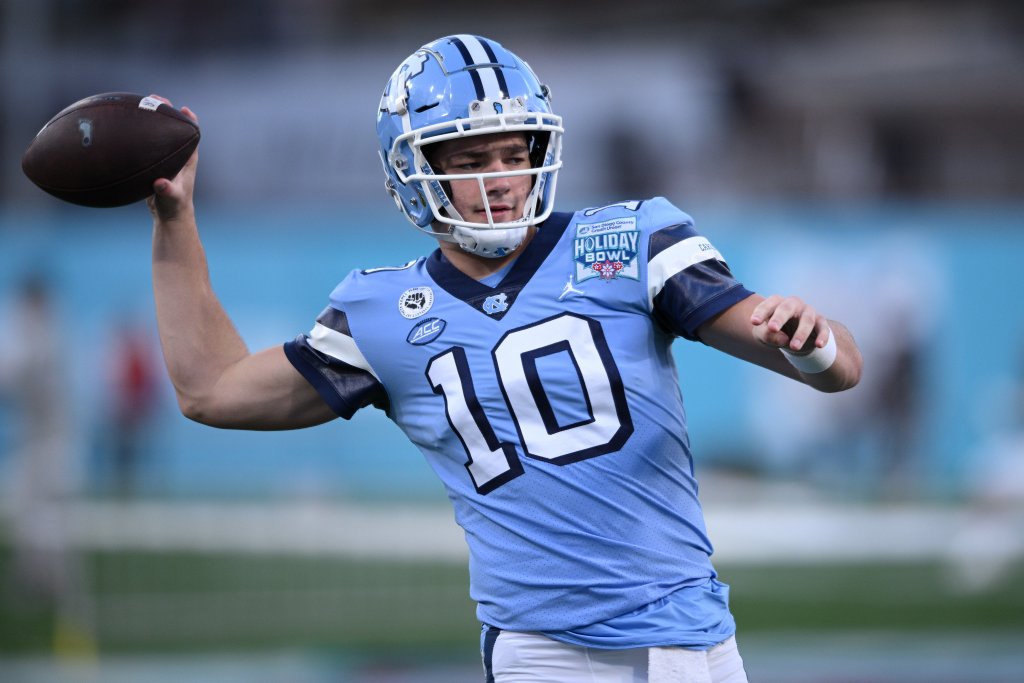Who Will Benefit From North Carolina Sports Betting Tax Revenue?
by Robert Linnehan in Sports Betting News
Updated Feb 23, 2024 · 7:09 AM PST
Dec 28, 2022; San Diego, CA, USA; North Carolina Tar Heels quarterback Drake Maye (10) warms up before the 2022 Holiday Bowl against the Oregon Ducks at Petco Park. Mandatory Credit: Orlando Ramirez-USA TODAY SportsBy FY 2024-25, North Carolina is expected to see more than $64 million in sports betting tax revenueIn five years, the Tar Heel State could see upwards of $100 million a year in sports betting tax revenueWhere will North Carolina sports betting taxes go?
In less than three weeks North Carolina will launch online sports betting and likely begin generating millions of dollars in tax revenue for the Tar Heel State.
But exactly how much tax revenue can the state expect? And where will this money go?
Fiscal estimates show that North Carolina could bring in nearly $100 million in sports betting tax revenue by its fifth full year of operation, with much of the revenue earmarked for higher education purposes, youth athletics, and the state’s general fund.
North Carolina online sports betting will launch on Monday, March 11.
Just How Much Revenue Will Sports Betting Bring?
Each potential bill in North Carolina requires a fiscal estimate for legislators to review. Fiscal estimates for HB 347, the bill that legalized North Carolina online sports betting, shows that the Tar Heel state should begin generating tax revenue in its second year at around $64 million. While no tax revenues are estimated for FY 2023-24, the state will see millions in licensing fees, which has been estimated at more than $10 million.
North Carolina legislators set the state’s online sports betting tax rate at 18% of gross sports betting revenue.
Each sports betting operator license costs $1 million to hold while service provider licenses costs $50,000 and sports wagering supplier licenses cost $30,000. The state is expected to award at least nine licenses off the bat prior to the March 11 launch, which would result in $9 million.
The following operators are expected to receive licenses within the next several weeks:
bet365 NCBetMGM NCCatawba Two Kings Casino (no operator yet)DraftKings NCFanatics Betting and GamingFanDuel NCPENN Sports Interactive (ESPN BET NC)Caesars Sportsbook NCUnderdog Sports
At present, the Lottery Commission has awarded two full supplier licenses, which cost $30,000 to hold. Additionally, 14 other provisional supplier licenses have been awarded, which also cost $30,000 to hold. All told, North Carolina will take in $480,000 is supplier license fees.
So while no tax revenue is expected for the first fiscal year, the state will take in nearly $10 million for the licenses that have, and will likely be, awarded to operators and suppliers.
But what can the state expect over the next several years? Here are the sports betting tax revenue estimates for the state’s first five years of operation:
FY 2023-24: $0FY 2024-25: $64.6 millionFY 2025-26: $83.5 millionFY 2026-27: $96.3 millionFY 2027-28: $100.6 million
If you compare North Carolina to a similarly sized state such as Virginia, the estimates seem like they could be spot on. Virginia legalized sports betting in 2021, taxing it at a 15% rate, and most recently reported $67 million in revenue in FY 2023, its second full year of operation.
North Carolina has a slightly higher population than Virginia and will tax sports betting at a higher rate, so the $83.5 million revenue estimate for its second full year could be spot on.
Where Will Sports Betting Taxes Go?
So where exactly will the state’s millions of dollars in sports betting tax revenues go? The North Carolina sports betting bill earmarks a majority of its tax revenue for higher education purposes, funding of youth sports, and the state’s general fund.
The North Carolina Department of Revenue will retain $0.5 million of tax revenue each year to offset the cost of collecting taxes, and the Lottery Commission will be reimbursed for any expenses not covered by fee revenue. After these costs are covered, the remaining tax revenues will be distributed as follows:
$2 million to the Department of Health and Human services for gambling addiction education and treatment programs$1 million to North Carolina Amateur Sports for local governments or nonprofits for youth sports equipment or facility upgrades$300,000 each to the 13 University of North Carolina constituent institutions to support college athletic departments$1 million to the North Carolina Outdoor Heritage Advisory Council for grants to assist sports teams with travel expense and incentive grant to attract sports events for nonprofessional athletes
The colleges eligible to receive the $300,000 are Appalachian State University, East Carolina University, Elizabeth City State University, Fayetteville State University, North Carolina Agricultural & Technical State University, North Carolina Central University, University of North Carolina at Asheville, University of North Carolina at Charlotte, University of North Carolina at Greensboro, University of North Carolina at Pembroke, University of North Carolina at Wilmington, Western Carolina University, and Winston-Salem State University.
If there are additional tax revenues they will be distributed in three ways:
20% distributed equally among the 13 UNC colleges noted above to support their athletic departments30% to the North Carolina Major Events, Games, and Attractions Fun50% to the general fund
Additional revenues are expected by the second year of operation. For instance, regulators believe that the general fund should see $28.1 million by the state’s second year of sports betting and $44.8 million by year five.


